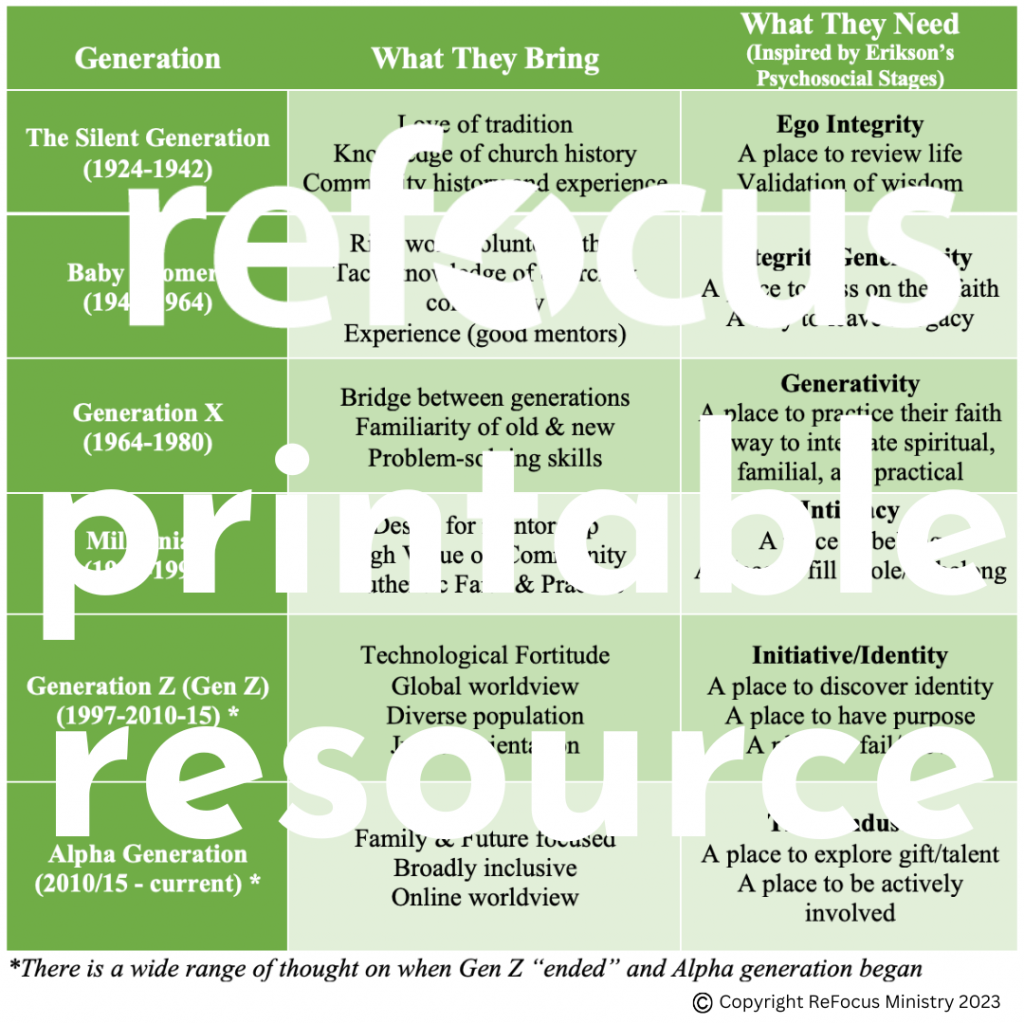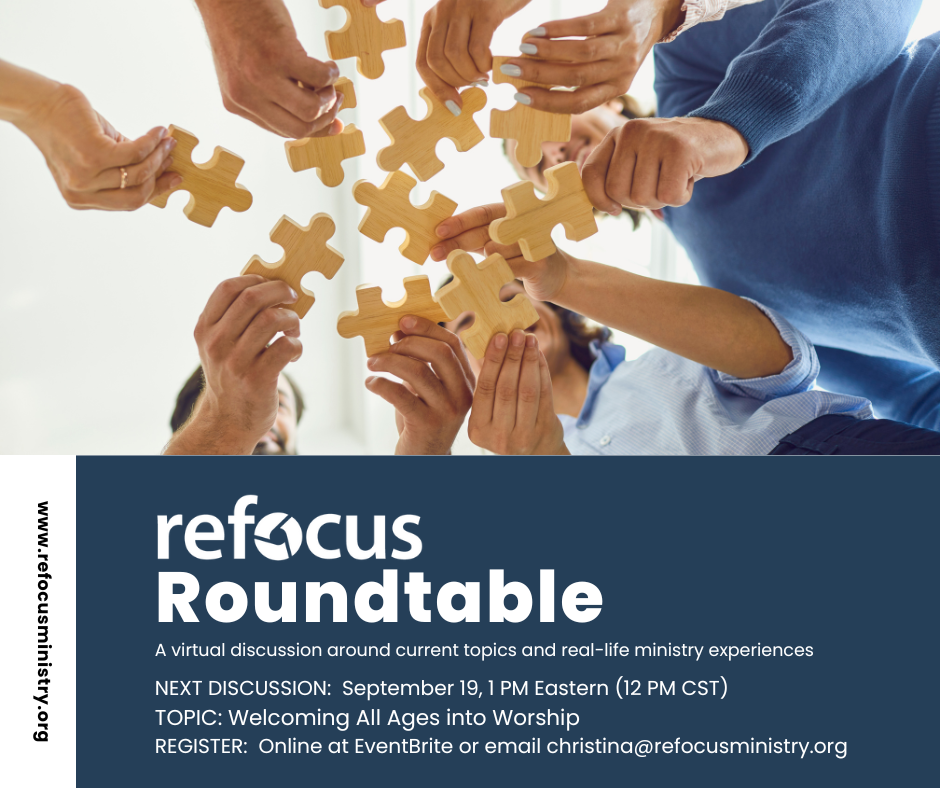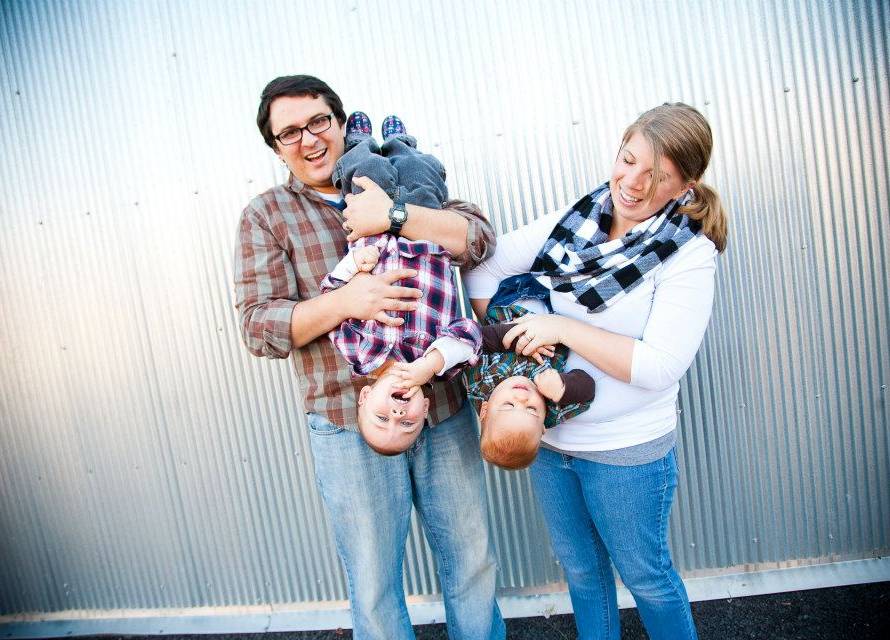Pew Research recently published in article in which they shared that they will be moving away from using generation-specific language in sharing their findings with the general public. Their article confirmed some of the important points about generational research that I have shared with churches I have coached in generational discipleship.

It’s likely you are at least marginally familiar with the groupings of generations that are alive today, beginning with the oldest living generation (Silent Generation) through the youngest generation (Gen Alpha). In between these are the Boomers, Gen Xers, Millennials, and Gen Z. It is also likely as you read through that list, a few stereotypes, a couple of colloquialisms, and maybe a couple of quippy statements (“Okay, Boomer” anyone?) went through your mind.
That’s because these generational frameworks have become more commonplace in recent decades. We hear about them in classrooms, on social media, in articles, and on news broadcasts. Statistics about everything from politics to phone preferences are shared under these labels. After all, the origins of these labels can be found in sociological work done for the purpose of marketing and targeting a specific audience.
And that’s precisely why Pew is choosing to move away from these labels and lean more towards actual birth years and life experiences rather than these labels that people attach more meaning to than might be factual or accurate. Some of the reasons they cited included:
- Generational categories are not scientifically defined – While sociology is a social science, it is not an empirical science which means it relies on data interpretation rather than reproducible experimentation. How do we know this applies to generations? Well, for example, numerous different years have been designated as to when generations start and end based on different data interoperation of different researchers. Another example, shared by Dr. Jean Twenge in her book Generations is the rise of multiple microgenerations.
- Generational labels can lead to stereotypes and oversimplification – As stated above, since so many of us have heard these labels used in describing certain behaviors or affiliations, it can be easy to make assumptions about people based on their age rather than who they are. The generational gap can be described as the perceived difference between ages or generations in a number of areas from politics to religion. The important word in that definition is “perceived.” Generational labels can lead towards widening that gap.
- Discussions about generation often focus on differences instead of similarities – Just like stereotypes can lead to a gap between generations, a focus on divisions can accentuate that divide by pulling people apart instead of helping them find places to grow together. When I speak with churches about connecting generations I often say something like, “The things that bring us together are not the things that keep us apart. We don’t come together around the latest popular meme or comparing medications we are now taking. We come together around Jesus.”
So what does that mean?
Do we just throw out all of the research that’s been done around generational characteristics and the implications they have on society and in our churches? No, that would be as silly as applying stereotypes to entire generations! As the researchers at Pew shared, “Despite these cautions, we still believe generational thinking can help us understand how societies change over time. The eras in which we come of age can leave a signature of common experiences and perspectives… It’s wise to think of terms like Gen Z, Millennial, Gen X and Baby Boomer as general reference points instead of scientific facts” (Source). Dr. Twenge mentioed above notes that in her book most of the graphs used are line graphs showing all the years rather than bar graphs using generational grouping for much the same reason that Pew research shares. But as she also shares, “Generational groupings are not perfect…but they persist because they are useful” (Source).
This has been the approach we’ve taken at ReFocus from the start. The vast amount of research available to us about generations and their experience in the world is quite helpful to us, especially when we talk about connecting generations. But our focus should primarily be on those things of value that each generation brings to the table and how we can foster relationship through the common bonds of faith and human experience.
The best intergenerational faith communities are defined, not by overarching stereotypes and general assumptions, but by opportunities for connections that lead to meaningful relationships that lead to lifelong discipleship and flourishing friendships.

If you would like to dig a little deeper into what each generation brings to and what they need from the faith community, we’ve put together an easy-to-understand chart that covers the basics of generational representation and involvement in the church.
Our goal is to focus on what builds community between generations, not what tears us apart. In the end, it is not our age or our life experience that defines us as the body of Christ – it is Christ, alone, that makes us a community.
Email us at christina@refocusministry.org, Subject: Generations in Community Chart, for your copy.
FAMILY MOVIE NIGHT

Free Resource from ReFocus Ministry
Movies are great because they tell a story, much like the narrative of Scripture and the parables that Jesus uses to each his disciples. Often in movies, we can find rich plots, interesting characters, and complex moral dilemmas and in those things, we can often find just the right opportunity to share with our kids how we can live out our faith or how God can meet our deepest needs. Capture these moments with our FREE Family Movie Night discipleship guide; simply download the PDF, pick your next movie, and share a meaningful moment together as a family.
ReFocus Roundtable: What “Welcome” Means
A virtual discussion around current topics and real-life ministry experiences

Last month, over one hundred parents and ministers shared a personal story with us of their experience with a lack of welcome and/or a request to remove a child from worship. Several asked good questions about how to address this, how to be a place of welcome, and how to deal with challenging behavior.
This September, ReFocus is hosting an online roundtable discussion for anyone interested in exploring this idea of welcome, specifically welcoming all ages in our worshipping communities, and how we can do that well.
Register using the link below and join us as we consider together how we can create a place of welcome for all.

Now Scheduling: Fall/Winter 2023
Christina Embree is the founder and director of ReFocus Ministry. She holds a masters in ministry focused on Children, Youth, and Family Ministry and a doctorate in spiritual formation with a focus on age segregation and intergenerational ministry. In addition to coaching churches of multiple denominations and traditions all around the globe, Christina serves as the Minister of Generational Discipleship for the Great Lakes Conference of the Brethren in Christ and as a pastor at Plowshares Brethren in Christ in Lexington, Kentucky. She is widely recognized as a speaker and author in the areas of generational discipleship, intergenerational ministry, and family ministry. As the mother of three children, she is familiar with the challenges of faith at home and pastoral ministry. She along with her husband Luke share a love for the church, their community, and the global work of peace and restoration through Jesus.


